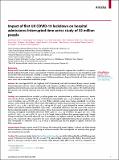Impact of first UK COVID-19 lockdown on hospital admissions : interrupted time series study of 32 million people
Abstract
Background Uncontrolled infection and lockdown measures introduced in response have resulted in an unprecedented challenge for health systems internationally. Whether such unprecedented impact was due to lockdown itself and recedes when such measures are lifted is unclear. We assessed the short- and medium-term impacts of the first lockdown measures on hospital care for tracer non-COVID-19 conditions in England, Scotland and Wales across diseases, sexes, and socioeconomic and ethnic groups. Methods We used OpenSAFELY (for England), EAVEII (Scotland), and SAIL Databank (Wales) to extract weekly hospital admission rates for cancer, cardiovascular and respiratory conditions (excluding COVID-19) from the pre-pandemic period until 25/10/2020 and conducted a controlled interrupted time series analysis. We undertook stratified analyses and assessed admission rates over seven months during which lockdown restrictions were gradually lifted. Findings Our combined dataset included 32 million people who contributed over 74 million person-years. Admission rates for all three conditions fell by 34.2% (Confidence Interval (CI): -43.0, -25.3) in England, 20.9% (CI: -27.8, -14.1) in Scotland, and 24.7% (CI: -36.7, -12.7) in Wales, with falls across every stratum considered. In all three nations, cancer-related admissions fell the most while respiratory-related admissions fell the least (e.g., rates fell by 40.5% (CI: -47.4, -33.6), 21.9% (CI: -35.4, -8.4), and 19.0% (CI: -30.6, -7.4) in England for cancer, cardiovascular-related, and respiratory-related admissions respectively). Unscheduled admissions rates fell more in the most than the least deprived quintile across all three nations. Some ethnic minority groups experienced greater falls in admissions (e.g., in England, unscheduled admissions fell by 9.5% (CI: -20.2, 1.2) for Whites, but 44.3% (CI: -71.0, -17.6), 34.6% (CI: -63.8, -5.3), and 25.6% (CI: -45.0, -6.3) for Mixed, Other and Black ethnic groups respectively). Despite easing of restrictions, the overall admission rates remained lower in England, Scotland, and Wales by 20.8%, 21.6%, and 22.0%, respectively when compared to the same period (August-September) during the pre-pandemic years. This corresponds to a reduction of 26.2, 23.8 and 30.2 admissions per 100,000 people in England, Scotland, and Wales respectively. Interpretation Hospital care for non-COVID diseases fell substantially across England, Scotland, and Wales during the first lockdown, with reductions persisting for at least six months. The most deprived and minority ethnic groups were impacted more severely. Funding This work was funded by the Medical Research Council as part of the Lifelong Health and Wellbeing study as part of National Core Studies (MC_PC_20030). SVK acknowledges funding from the Medical Research Council (MC_UU_00022/2), and the Scottish Government Chief Scientist Office (SPHSU17). EAVE II is funded by the Medical Research Council (MR/R008345/1) with the support of BREATHE – The Health Data Research Hub for Respiratory Health (MC_PC_19004), which is funded through the UK Research and Innovation Industrial Strategy Challenge Fund and delivered through Health Data Research UK. BG has received research funding from the NHS National Institute for Health Research (NIHR), the Wellcome Trust, Health Data Research UK, Asthma UK, the British Lung Foundation, and the Longitudinal Health and Wellbeing strand of the National Core Studies programme.
Citation
Shah , S A , Brophy , S , Kennedy , J , Fisher , L , Walker , A , Mackenna , B , Curtis , H , Inglesby , P , Davy , S , Bacon , S , Goldacre , B , Agrawal , U , Moore , E , Simpson , C R , Macleod , J , Cooksey , R , Sheikh , A & Katikireddi , S V 2022 , ' Impact of first UK COVID-19 lockdown on hospital admissions : interrupted time series study of 32 million people ' , EClinicalMedicine , vol. 49 , 101462 . https://doi.org/10.1016/j.eclinm.2022.101462
Publication
EClinicalMedicine
Status
Peer reviewed
ISSN
2589-5370Type
Journal article
Description
This work was funded by the Medical Research Council as part of the Lifelong Health and Wellbeing study as part of National Core Studies (MC_PC_20030). SVK acknowledges funding from the Medical Research Council (MC_UU_00022/2), and the Scottish Government Chief Scientist Office (SPHSU17). EAVE II is funded by the Medical Research Council (MR/R008345/1) with the support of BREATHE – The Health Data Research Hub for Respiratory Health (MC_PC_19004), which is funded through the UK Research and Innovation Industrial Strategy Challenge Fund and delivered through Health Data Research UK. BG has received research funding from the NHS National Institute for Health Research (NIHR), the Wellcome Trust, Health Data Research UK, Asthma UK, the British Lung Foundation, and the Longitudinal Health and Wellbeing strand of the National Core Studies programme.Collections
Items in the St Andrews Research Repository are protected by copyright, with all rights reserved, unless otherwise indicated.

